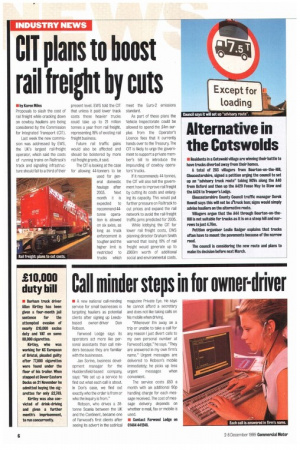CIT plans to boost rail freight by cuts
Page 8

If you've noticed an error in this article please click here to report it so we can fix it.
• by Karen Mies
Proposals to slash the cost of rail freight while cracking down on cowboy hauliers are being considered by the Commission For Integrated Transport (CIT).
Last week the new commission was addressed by EWS, the UK's largest rail-freight operator, which said the costs of running trains an RaiItrack's track and signalling infrastructure should fall to a third of their present level. EWS told the CIT that unless it paid lower track costs these heavier trucks could take up to 21 million tonnes a year from rail freight, representing 19% of existing rail freight business.
Future rail traffic gains would also be affected and should be bolstered by more rail freight grants, it said.
The CIT is looking at the case for allowing 44-tonners to be used for general domestic haulage after
2003. Next month it is expected to recommend 44tonne operation is allowed on six axles, as long as truck enforcement is tougher and the higher limit is restricted to trucks which
meet the Euro-2 emissions standard.
As part of these plans the Vehicle Inspectorate could be allowed to spend the £4m surplus from the Operators Licence fees that it currently hands over to the Treasury The CIT is likely to urge the government to support a private member's bill to introduce the impounding of cowboy operators' trucks.
If it recommends 44 tonnes, the CIT will also tell the government how to improve rail freight by cutting its costs and enlarging its capacity. This would put further pressure on RaiItrack to cut prices and expand the rail network to avoid the rail-freight traffic jams predicted for 2005.
While lobbying the CIT for lower rail freight costs, EWS planning director Graham Smith warned that losing 19% of rail freight would generate up to £900m worth of additional social and environmental costs.








































































































